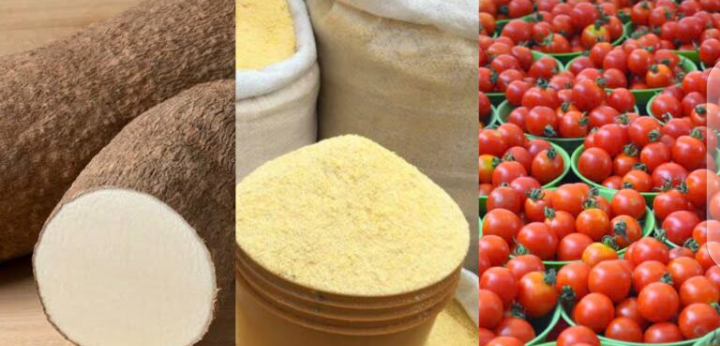Some farmers and food sellers in the South-South region have expressed concerns over the high cost of food notwithstanding the harvest season.
The stakeholders, who spoke during a survey in Akwa Ibom, Rivers and Cross Rivers states said that remarkable fall in food prices were witnessed during the previous harvest season.
The stakeholders maintained that only a few food items recorded insignificant price drops during the current season.
Speaking in Port Harcourt, Rivers, a footsuff seller, Benedicta Amadi, said that the impact of the harvest season was not felt by consumers due to the high cost of transportation.
Mrs Amadi said that a greater percentage of her business profit was currently being channelled to transportation which had led to increased costs.
She explained that during the 2023 harvest season, a sizable tuber of yam was sold for N800 while currently, the same size was being sold for between N4,000 and N6,000.
‘’Perishables items such as tomatoes, onion and pepper recorded an incomparable price disparity between 2023 and 2024 harvest season.”
“A basket of pepper which was sold between N1,500 and N3,000 in 2023 is now almost N16,000. It is the same with tomatoes, onions and others,” she said.
Mrs Amadi said that the prices of rice, beans and corn might drop during the dry season in some parts of the country, saying,” this might not be felt in Rivers State if the current transportation situation persists”
She urged the Federal Government to be proactive towards implementing its palliative measures in the transportation sector, saying that such would impact positively on food prices.
Similarly, a cassava farmer, Godwin Akandu, noted that currently only an insignificant fall in the prices of ‘garri’ and vegetables had been recorded compared to their costs a few months ago
He attributed the price difference to the premature harvest of cassava and vegetables, a measure adopted by farmers to reduce loss in the event of flood disaster.
He said, “Garri, a cassava by-product and staple food for households in the state, has recorded a huge price gap between the 2023 and 2024 harvest seasons. A basin of garri sold for N7,000 in 2023, now sells for between N16,000 and N18,000, since both the production and transportation processes are dependent on petrol.’’
Mr Akandu who is the President, Etche Farmers Cooperative Union, urged the state government to urgently key into the Federal Government agricultural programme to enhance food availability in the state.
He urged the state government to invest in mechanised agriculture through collaborative engagements with farmers as being done in other states to overcome the challenge of high food prices.
In his contribution, Programme Manager, Agricultural Development Program, Christopher Tamuno, disclosed that the state would soon benefit from agro-inputs distribution from the Federal Government.
He explained that the distribution which was delayed by the nationwide hunger protests was part of the Federal Government’s agricultural palliative expected to boost food production.
Mr Tamuno, however, assured of ADP’s readiness to further enhance agriculture through the training and re-training of farmers in the state.
In Akwa Ibom, a foodstuff seller at Udua Nka Market in Eket, Happiness Oboh, said that the change in price of foodstuff during the current harvest season was insignificant.
She said that there were insignificant drops in the cost of commodities, especially farm produce.
“A bag of garri which sold for N120,000 in May, now sells for N105,000, but a tuber of yam which sold for N10,000 in May currently sells for N16,000,” she said.
Mrs Oboh added that a bag of beans between February and March was sold for N55,000, but currently costs between N80,000 and N250,000.
She said that a bag of rice currently sells for between N80,000 and N85,000 as against N50,000 which was the cost in January.
She said that multiple market unions were also a contributing factor to the current price increase.
Speaking also,Chairman, All Farmers Association of Nigeria, Akwa Ibom State chapter, Bassey Inwang, listed high cost of fuel, herders menace and inadequate farmland as part of the factors causing high cost of food.
Mr Inwang outlined the parameters the government should put in place in order to ensure food availability and sufficiency for the people.
He said that timely distribution of farm inputs, grants and loans to farmers would enhance early cultivation because agriculture remained a time-bound activity
“Others include availability of farmland to farmers to cultivate, checking the government policy in disbursing loans to the farmers and availability of modern machines,” he said.
According to him, Nigeria should endeavour to embrace mechanised farming to ensure greater harvests
Mr Inwang, who included insecurity as part of causes of food insufficiency, stated that fear of being killed or injured had led many to abandon farming.
He further stated that the activities of herdsmen had negatively affected farming in the state, citing the story of a woman whose two-hectare cassava farm along Airport Road was destroyed by cows.
Mr Inwang also emphasized the importance of food storage facilities especially for perishable food items such as tomatoes, vegetables and fruits, assuring that food prices would soon drop due to the approaching harvest season.
In Cross River, A trader, Mubarak Ibrahim who operates at the popular Bogobiri Area, close to Watt Market in Calabar, stated that there was a minimal decrease in the cost of some foodstuffs.
The trader who deals in staple foods such as rice, beans, and others, said that a 50kg bag of local rice was being sold for N85,000 as against N88,000 in July.
Mr Ibrahim added that a 100kg bag of white bean was currently sold between N190,000 and N195,000 as against N210,000 it sold a month ago.
He stated that the price of brown beans remained at N220,000 for 100kg bag and that of white maize dropped from N120,000 to N90,000 while yellow maize is still at N120,000 for 50kg bag.
Similarly, a dealer in tomatoes, Ibrahim Samsudeen, said that the cost of Nigerian tomatoes was still high compared to Cameroonian tomatoes.
Mr Samsudeen explained that a basket of Cameroonian tomatoes which was sold at N28,000 in July, was now sold for N24,000.
He said that there was a remarkable reduction in the price of pepper as a 50kg bag of pepper which sold for about N200,000 had dropped to between N90,000 and N100,000.
Speaking on the matter, Cross River State Commissioner for Agriculture and Irrigation Development, Johnson Ebokpo, said the state government had procured 108 medium tractors to be distributed to cooperative societies across the state.
He said that cultivation of 50,000 hectares of rice in Ogoja had commenced, and that 90 hectares of cassava was also being cultivated in 10 communities across the state.
The commissioner said that the farms were being cultivated under the jointly funded Livelihood Improvement Family Enterprise Project for Niger Delta programme.
Mr Ebokpo said that with the ongoing policy implementations, food production in the state would quadruple by the 2025 harvest season.
(NAN)



